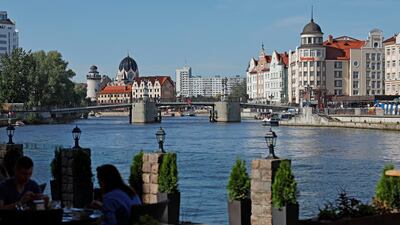The Kremlin on Wednesday criticised Poland for renaming the Russian city of Kaliningrad in official documents, the latest in a flurry of grievances between the two countries.
Poland separately summoned Moscow’s ambassador to complain about an incident over the Black Sea involving a Russian fighter jet and a Polish border patrol plane.
Reports in Polish media meanwhile claimed a military object found near the border with Ukraine last month was a Russian KH-55 missile.
Kremlin spokesman Dmitry Peskov said on Wednesday that Poland “throughout history has slipped from time to time into this madness of hatred towards Russians”.
He said Poland’s move to redesignate Kaliningrad as Krolewiec was a “hostile act” that “bordered on madness”.
Kaliningrad is a Russian-controlled enclave bordering Poland, Lithuania and the Baltic Sea.
It was known by its German name Koenigsberg until it was captured by Soviet forces in 1945. Krolewiec is the Polish equivalent.
Poland said it “evoked negative emotions” to usce the name of senior Soviet figure Mikhail Kalinin, seen as complicit in the Katyn massacre of thousands of Poles during the Second World War.
It said the name change was symbolic and did not amount to disputing Kaliningrad’s status.
“We do not want Russification in Poland and that is why we have decided to change the name in our native language,” said the government’s Economic Development Minister Waldemar Buda.

Poland has been one of Russia’s most outspoken critics before and during the war in Ukraine, driven partly by its emotionally charged history of Soviet occupation.
Russia’s ambassador Sergey Andreev has been summoned to the foreign ministry twice in six days and was blocked by protesters from laying a wreath on May 9, the day Russia commemorated the Soviet victory in 1945.
His summoning on Wednesday involved an apparent near-miss three days earlier between a Russian Su-35 warplane and a Polish aircraft on patrol for EU border agency Frontex.
Poland’s border guard said the Russian jet made “aggressive and dangerous manoeuvres” and passed the Polish plane “at a dangerous distance” estimated by the crew as five metres.
Romania gave a similar account and said the Russian plane’s antics were “totally unacceptable”.
A further mysterious incident involved a “military object” found in a Polish forest last month without any trace of an explosion.
Two Polish broadcasters reported on Wednesday without naming sources that it was believed by Poland’s Air Force Institute of Technology to have been a Russian missile. There was no immediate comment from officials.
Nato had a scare last year when the explosion of a Soviet-made missile killed two people on Polish territory, raising fears of an escalation of the war.
It later emerged they were stray Ukrainian missiles. Poland said it did not blame Ukraine for firing the rockets while under attack from Russian air strikes.
Ukraine said this week it would symbolically switch from celebrating Victory Day on May 9 to holding commemorations on the May 8 date marked by western allies.
Moscow's celebrations were scaled down amid security scares behind Russian lines and losses of military equipment in Ukraine.


